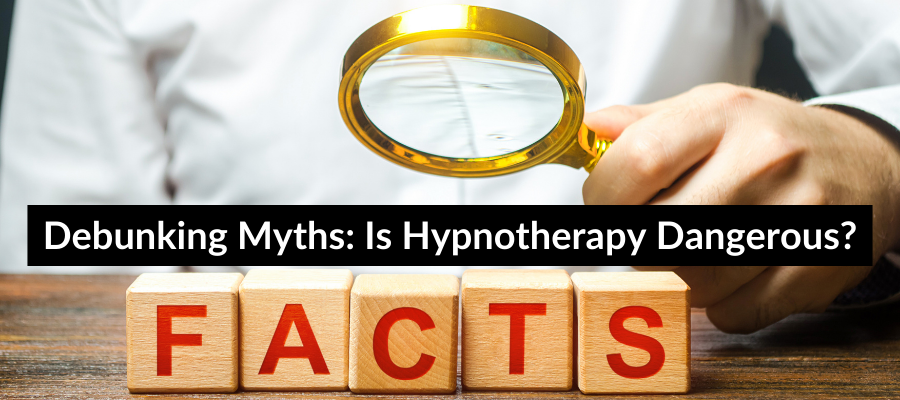Let’s start debunking hypnotherapy myths and after seeing the way Hypnotherapy is often misconstrued by media, I thought it was a good time to address it with a blog post so let’s start
Is Hypnotherapy Dangerous?
Hypnotherapy, at its core, is a safe and well-established form of complementary therapy. It involves inducing a trance-like state, also known as hypnosis, to enhance focus and concentration, allowing the participant to be more open to therapeutic suggestions.
One important thing to remember is that hypnosis is a “do with” process. This means that during the entire session, the participant is in complete control. Hypnosis is not a loss of control; rather, it’s a heightened state of awareness where the individual is fully in control and able to terminate the session at any time. This also means that a hypnotherapist cannot make you dance like a chicken or bark like a dog unless you decide to do so.
If you’re curious about how hypnosis works and its benefits, you might enjoy reading What is Hypnotherapy: Debunking Myths and Exploring Healing.
Can Hypnosis Manipulate or Coerce?
One of the main concerns people express is the fear of being manipulated or coerced while under hypnosis. Let’s dispel this myth now. Ethical hypnotherapy practices strictly adhere to principles of informed consent and respect for the individual’s autonomy.
A skilled hypnotherapist acts as a guide, facilitating a collaborative process that empowers the individual rather than diminishing their control. As mentioned earlier, it’s a “do with” process between the hypnotherapist and the participant.
For further insights into common misconceptions about hypnotherapy, check out Everyday Trance: 10 Inducers and Their Impact on Your Life.
Does Hypnosis Lead to False Memories?
Another misconception is that hypnosis can unearth repressed memories and lead to false recollections. Reputable hypnotherapists are trained to avoid suggestive questioning and to guide clients responsibly. The focus is on addressing present concerns and helping individuals achieve their therapeutic goals rather than delving into the murky waters of past traumas.
The Evidence Supporting Hypnotherapy
Research supports the safety and efficacy of hypnotherapy across various applications. It has been endorsed by reputable organisations such as the American Psychological Association (APA), the British Psychological Society (BPS) and the Australian Hypnotherapists Association (AHA) for its role in pain management, reducing anxiety, and aiding in behavioural changes such as smoking cessation and weight loss. Having this reputable organisations supporting hypnotherapy should be evidence enough with Debunking Hypnotherapy Myths but let’s continue.
You can explore more about the link between hypnotherapy and anxiety relief in my blog post Unveiling the Link Between Past Life Regression and Anxiety Relief.
Finding the Right Hypnotherapist
While hypnotherapy is generally safe, it’s essential to seek the services of a qualified and certified professional. I’ll add here: work with someone you align with and feel comfortable with. Trust, understanding, and rapport with your practitioner are vital, no matter the modality.
If your intuition says no or something doesn’t feel right—listen to yourself. Individuals with certain psychological conditions or those prone to dissociation should consult with their healthcare provider before undergoing hypnotherapy.
You can learn more about ethical hypnotherapy practices and how to choose a therapist by reading Decoding Past Life Regression Therapy Ethics: A Guide.
Conclusion: Hypnotherapy for Safe Transformation
When hypnosis is conducted by a qualified and ethical professional, it is a safe, evidence-based approach to addressing various concerns. As with any form of therapy, the key lies in practicing responsibly and staying informed. This allows individuals to fully harness the positive and transformative benefits of hypnotherapy.
Ready to Transform? Book Your Session with Me!
Ready to experience the positive transformations that hypnotherapy can offer?
Book your session with Kylie, a certified and experienced hypnotherapist. Take the first step toward your well-being journey and discover the empowering possibilities of hypnotherapy.


Another well written blog and highly accurate too. Hypnosis well debunked! Great work. I would definitely have another hypnosis session with you and found my session very effective in achiveing my goals. I highly recommend it to anyone contemplating this modality.